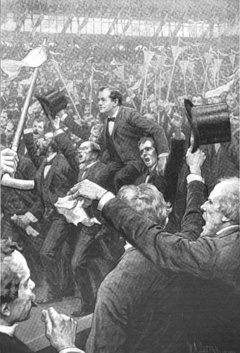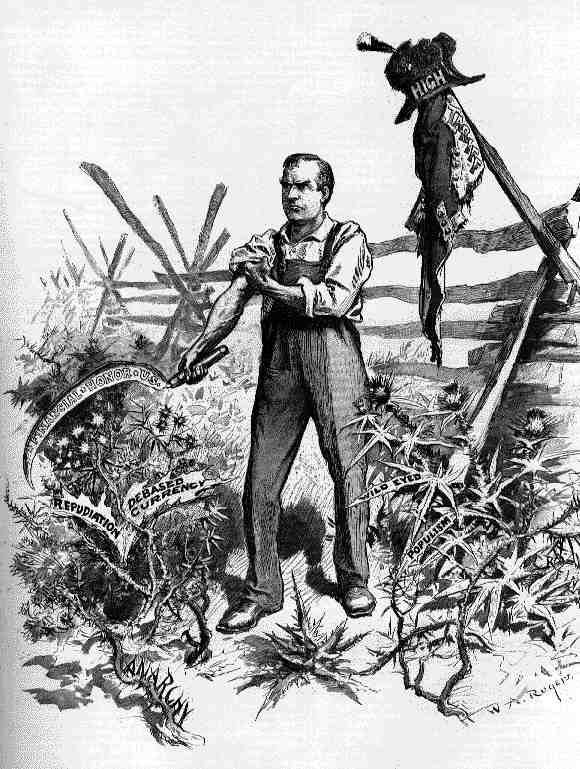The United States of America Under the Presidency of Democrat William Jennings Bryan
What follows is an attempt to reconcile historical realities from OTL to events in TTL, with a particular focus on politics. I also want to explore a handful of US domestic issues that were historically relevant for the US at this time and which I think would be fun to explore in this timeline also.
I will begin with Free Silver.
Free Silver
Bryan won the nomination for the 1896 Democratic presidential ticket with his now famous
Cross of Gold speech in which he decried the
Coinage Act of 1873 which effectively put the United States uniquely on the gold standard and abolished the American Silver Dollar. The speech called for the adoption of bimetallism, resuming the minting of silver-based US currency.
Bryan carried on the shoulders of his supporters after his ‘Cross of Gold Speech’
‘Free Silver’ was advocated by Bryan, not only for its populism and as a means to garner votes, but from a genuine belief that increased circulating currency would benefit the country’s economic health.
The 1880s saw a steep decline in the prices of grain and other agricultural commodities. Silver advocates argued that this dropoff, which caused the price of grain to fall below its cost of production, was caused by the failure of the government to adequately increase the money supply, which had remained steady on a per capita basis.
The effects of the recession which began in 1893, and which continued through 1897, ruined many Americans. Unemployment rates ran as high as 25%. The task of relieving the jobless fell to churches and other charities, as well as to labor unions. Farmers went bankrupt; their farms were sold to pay their debts. Some of the impoverished died of disease or starvation; others killed themselves.
Indeed, because gold was deflationary, individuals taking on debt to deal with reduced agricultural income or to finance commercial investments were being faced with
relatively increased debt burden as the value of the dollar rose and the value of their physical wealth fell relative to gold.
For the bimetallists, Free Silver would alleviate that pressure, and while obviously not popular with the big eastern banks, would allow debtors to settle their debts and re-invest locally. Free silver became increasingly associated with Populism, unions, and the fight of ordinary Americans against the bankers, railroad monopolists, and the robber barons of the Gilded Age capitalism era and was referred to as the "People's Money"
In 1897, acting on Bryan’s campaign promises, the simply named ‘Silver Act’ made silver a national US currency at a ratio of 16 ounces of silver to 1 ounce of gold.
By 1900, the ramifications of the Silver Act are still being uncovered and it cannot be said that the road to recovery has not been without its bumps and potholes.
There is no doubt that Free Silver made more money available to the lower and middle class and led to significant reduction in bank-held debt, and for this Bryan can claim victory. Surprisingly, in addition to the farmers and ranchers, it was domestic industry that benefited from the Silver Act. An unforeseen circumstance of the act was an increase in the immediate spending power of middle-class Americans and this in turn led to increased consumption of consumer goods and growth of the domestic US industrial sector.
It has also, however, led to rapid inflation and indeed 1897 saw 26% inflation in consumer goods, while 1898 saw 12% and 1899 saw a rise of 9%. Industry wages have not kept up with rates of inflation and while urban factory workers were very happy to enjoy increased spending power and reduced debt in 1897 and 1898, they now find themselves with relatively reduced spending power.
Indeed, inflation and falling buying power for the urban factory worker were a major focus of the recent 1900 elections with the Republican nominee William McKinney sought to end inflation by abandoning silver (and winning the votes of much of eastern big business and finance) and Bryan appealing to his populist base by scapegoating ‘unprogressive’ industry monopolists unwilling to keep pace with technology and economic practicalities (ie- adopt scientific management practices and increase wages).
Bryan blamed poor wages and predatory business practices on the large monopolies and passed the
Norwell Antitrust Act of 1898 and spoke eloquently about a ‘progressive future’ that embraced ‘modernism’, while referring to the works of
Frederick Taylor.
The already influential labor unions had grown increasingly powerful between 1896 and 1900 and during the 1900 elections McKinney ignored them to his peril. Bryan was re-elected despite the increasingly difficult financial situations of factory workers on the promise of supporting trade unions and commitment to increasing wages (I’ll try to write about the potent labor movement listed in the USA stats as a ‘dominant issue’ later as well)
While there is no doubting that the economic depression of 1893 is now passed, some say it would have passed anyway. Free Silver remains controversial and has not been the panacea many thought it would be.


